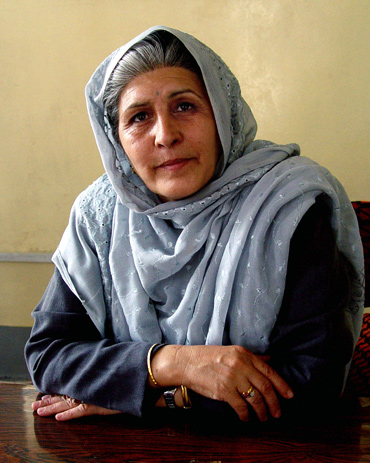
Tajwar
“Just every night for one hour I looked in the mirror, I talked to my reflection, I asked what will I do? I made a plan and every time I put the way to me and I saw that if I go in that way, I will die, I will be finished. If I go in the other way, How will I face it? And I made a plan….” Read More
About Tajwar
(Find out more about Tajwar in her 2010 update.)
The daughter of the chief of the Pashtun Kakar clan, and married at 14 as a second wife to an Usbek, she had a very difficult time in this family of a different culture and language. Nevertheless, in spite of her tremendous household responsibilities and the children she began bearing, she finished high school and then teacher training. (She had 6 children by the time she finished her education.)
When the Russians came, her husband’s entire family sided with them. The first wife’s two sons worked for the KGB and Tajwar was under tremendous pressure to join the communist party. She was watched and taken in for interrogation, etc. but she still refused to join. Not only that, but she became a leader of the freedom fighters, often sneaking off to different villages to meet with her colleagues. She had numerous narrow escapes, including having to leave for Kabul on foot with her 4 children, 7 days after the birth of her 5th. Later, she was captured by the Russians, tortured and then held for a year. Finally, she was released and escaped to Pakistan where she got a job with the IRC (International Rescue Committee) which took quite some doing for a woman.
An ardent spokeswoman for women’s rights, Tajwar was instrumental in establishing schools for girls in the Afghan refugee camps. When a co-worker at IRC was assassinated and the IRC was notified that she was the next target, they sent her to Australia. There, over the course of a dozen years, she underwent 12 surgeries for cancer.
In 2000 she went back to Afghanistan. During talks with senior Taliban leaders she convinced them to let her open Hope School. (The girls’ school part of her proposal was agreed to but never implemented) She worked in the school office until it was mistakenly bombed by U.S. forces. Today she divides her time between work for the IRC and the rebuilding of Hope School.
What advice can you give someone who needs courage?
Life is not easy. Life has two faces. One is a good face, one is a danger face. The good face is easy, everybody can handle it. But with the bad face, it’s necessary to fight and find the way. When I married I went to a different family with different customs. They were Usbek, I was Pashtun. I thought that if somebody doesn’t understand swimming and they go in the water they have two ways. One way they will drown. The other way you will try to come out, learn to swim, how to stay alive. Find a good way. When I married, I was a student in grade 8. That wasn’t easy. Nobody looked after my children. I didn’t understand their language. I didn’t understand their culture. Just every night for one hour I looked in the mirror, I talked to my reflection, I asked what will I do? I made a plan and every time I put the way to me and I saw that if I go in that way, I will die, I will be finished. If I go in the other way, How will I face it? And I made a plan…
« back to Portraits & Stories list